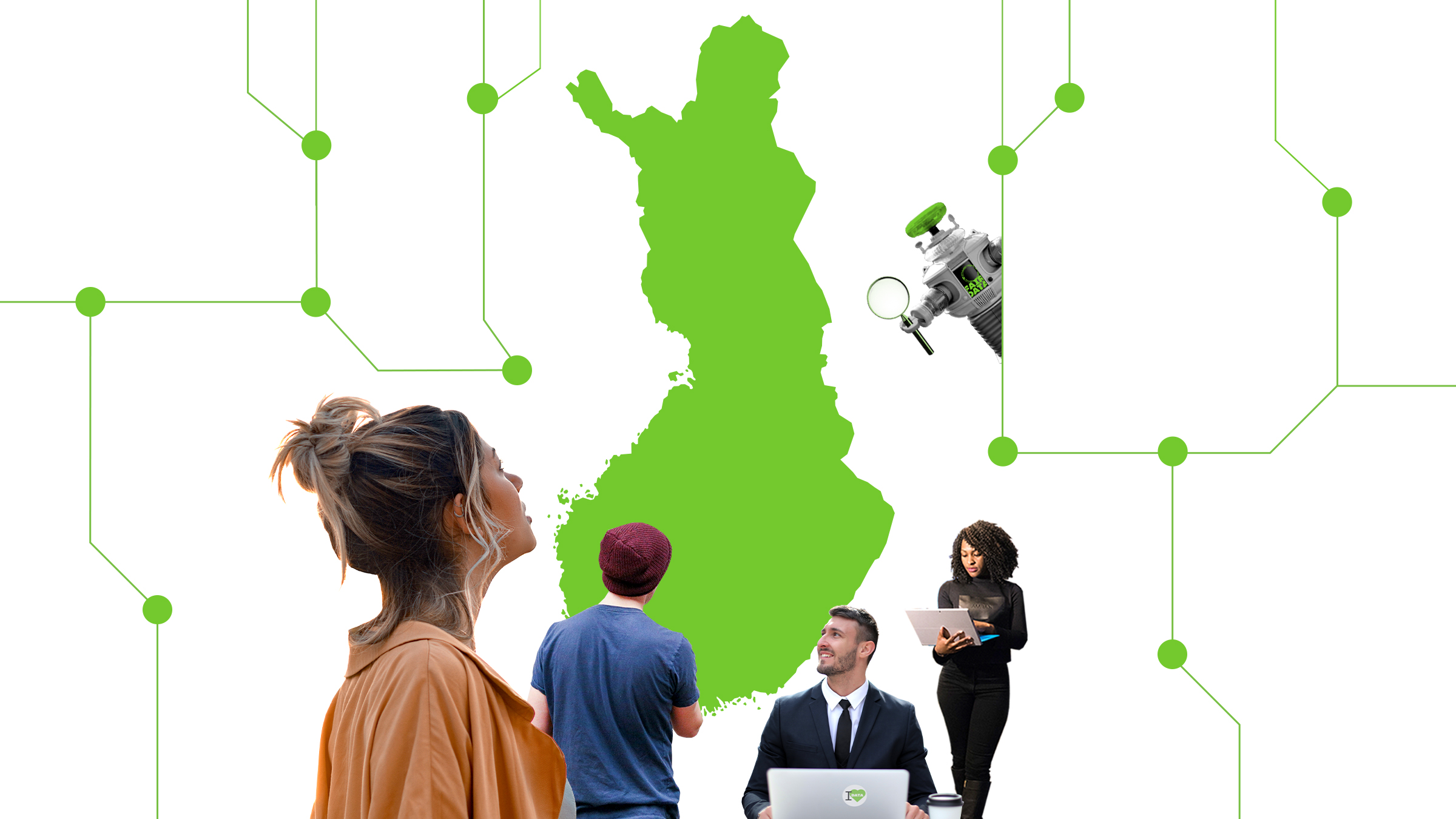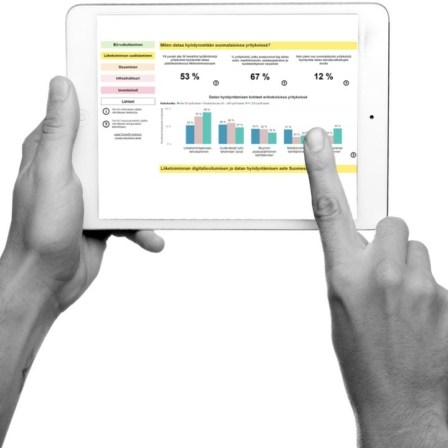Finnish data-sharing networks, or data ecosystems, have seen clear benefits from data sharing. Companies and public sector organisations recently surveyed by Sitra reported using shared data to streamline their processes, create new and better services and launch new projects with their partners.
Network actors have also gained access to new information from partners and increased their understanding of their own strengths, development areas, business and industry.
The strengths of data ecosystems are evident in developing customer-oriented services and networking, but they need additional additional proficiency for business growth, the survey revealed. Most ecosystems are looking to deepen collaboration and service delivery with partners in the future.
Sitra’s 2023 survey on the situation of data ecosystems and networks was conducted in May and June 2023 in collaboration with the consultancy Innolink. The aim was to find out how data ecosystems operate and to gain an overall view of their state of development, challenges and strengths, and the benefits of data sharing. The survey involved 111 respondents from different data ecosystems across a wide range of industries.
The future data economy depends on collaborative networks
In an increasingly complex environment, it’s important to develop solutions to meet challenging customer requirements and adapt your own operations. Often the expertise or resources of a single organisation are not enough, but solutions can be found by working with partners, creating networks and ecosystems that work in the same direction. When the data to be collected and analysed is one of the starting points or enablers of collaborative innovation in networks, they are called data ecosystems or networks.
A data ecosystem or network involves at least three organisations sharing data with a common goal. Larger data repositories enable existing processes to be improved and new business to be created. The ecosystem may result in a common product, service or solution, or each participant may develop its own product using the shared data. This often requires the development of operational cultures and the seamless interoperability of data from different sources. A functional infrastructure and trust between actors are also needed to ensure the rights to use the data.
It is therefore important for Finnish companies and organisations to better understand the modalities and potential of collaborative networks.
Major benefits for ecosystems from data sharing
So what is the experience of Finnish companies and public sector actors in using and sharing data with partners?
The vast majority of respondents, around 67%, reported that there have been tangible benefits from data sharing. The biggest benefits were finding new customers and partners, the ability to create new services and new business, and to improve processes.
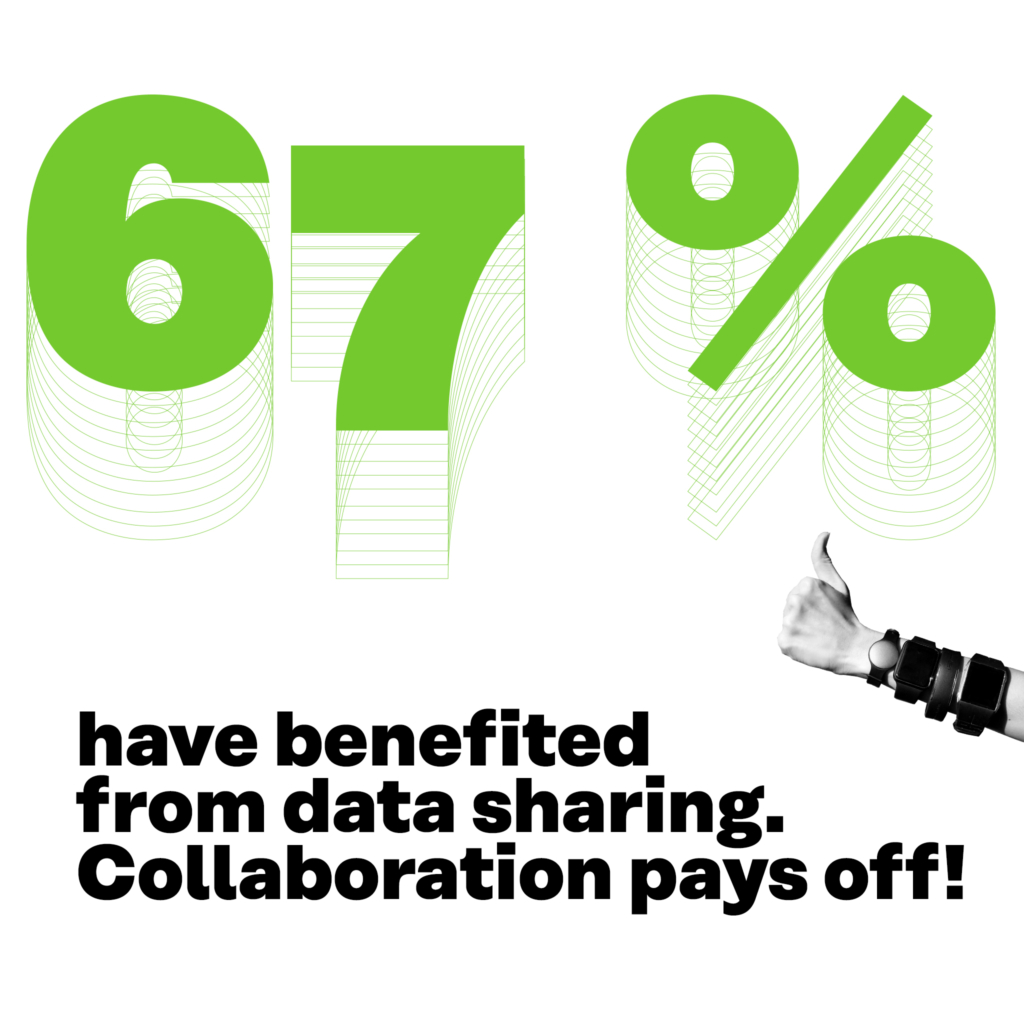
“Our organisation is looking to the ecosystem for new ideas, projects and new ways of working together,” said one network member in response to the survey. Other benefits included creating new pilots and projects, reducing manual work, increasing knowledge and therefore understanding, improving image through collaboration, better knowledge management and reducing emissions through collaboration.
The results of the survey support previous studies, which have also found that data sharing benefits organisations. A study by the technology services company CapGemini found that data sharing generally leads to revenue growth, productivity improvements and significant increases in customer satisfaction.
Our organisation is looking to the ecosystem for new ideas, projects and new forms of collaboration.
Member of a data network
One-third only in the early stages of data sharing
However, up to a third of Sitra respondents could not judge or did not know whether data sharing had been beneficial. How to explain this relatively high percentage? Based on the survey results, the answer seems to lie in the level of development of the ecosystem or its member organisations.
The evolution of an organisation’s use of data can be divided into four stages:
- The organisation uses only its own internal data.
- The organisation uses only its own internal data, but also external data sources and open data.
- The organisation creates a loose network of data sharing with other actors.
- The organisation is an integral part of a tight data ecosystem with clear common services, rules, contracts and policies that together deliver a seamless service to the end customer.
Sitra has created a four-stage development model, based on elements from the academic literature.
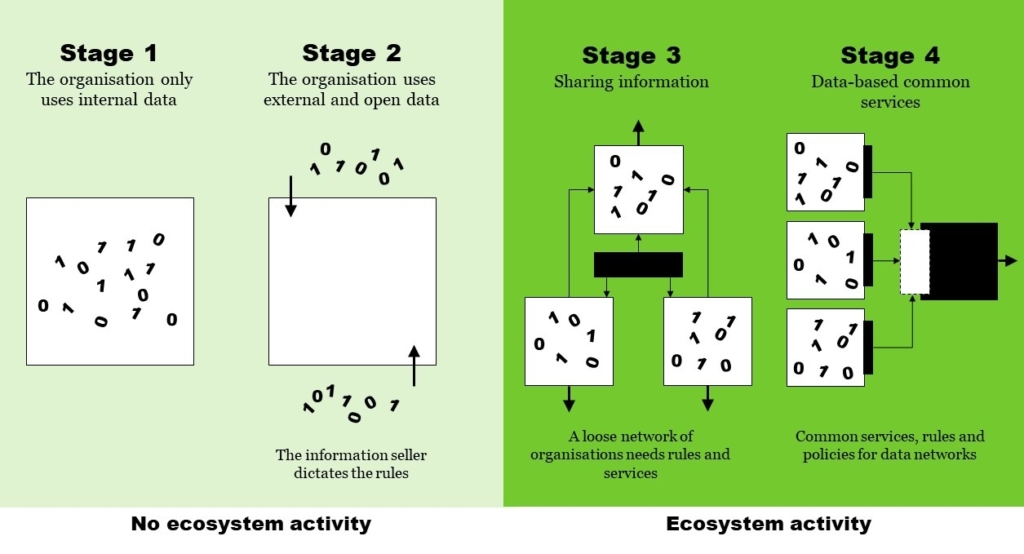
Graphic: Sitra and PunaMusta
In stages 1 and 2, the organisation is in the early phases of using data, while in stages 3 and 4, data is already being shared between partners or even used to create common services. 64% of respondents considered themselves to have already reached stage 3 or 4, meaning that they identified themselves as being advanced in their use of data.
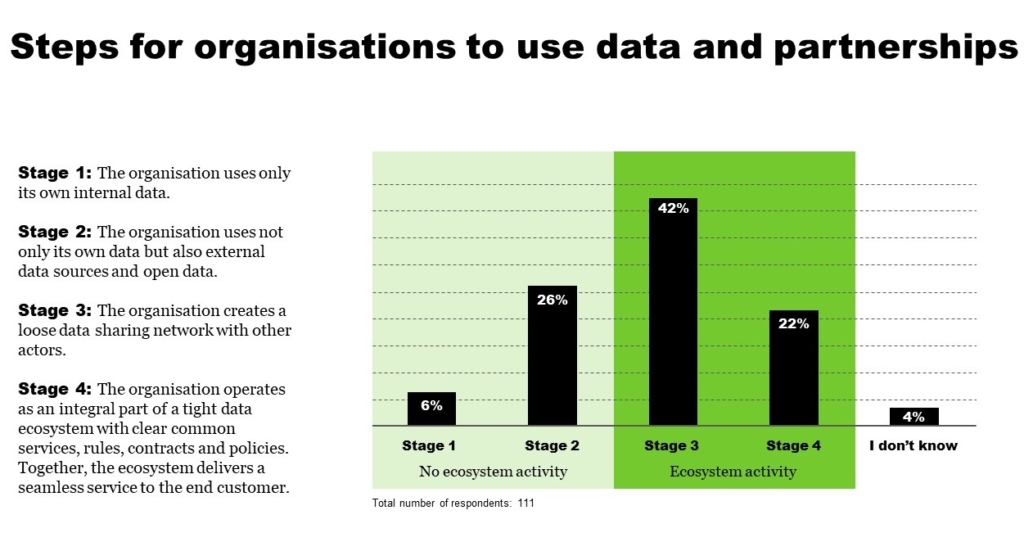
However, more than one in three, about 36% of respondents, were unable to say what stage their own organisation was at, or thought it was only at the first or second stage. This finding may help to explain why a relatively high proportion of the organisations surveyed have not seen significant benefits from sharing data in the ecosystem. For example, if the ecosystem is not yet well developed, data sharing may not yet have taken place properly and therefore the benefits are unlikely to have been realised. Such ecosystems have a long way to go to reach their full potential.
Rulebook for a Fair Data Economy to support ecosystems
Tools already exist for ecosystems and networks to support data sharing. Sitra’s Rulebook for a Fair Data Economy provides model templates and checklists to help ecosystems get started in developing common rules for data sharing.
Sitra is currently working on a more comprehensive handbook and tools to support ecosystems, which will be published in early 2024. Stay tuned, the handbook will be published on Sitra.fi.
Cooperation also aims to develop the sector
Ecosystems have been created, for example, to boost internal development in a particular industry, to bring together actors in a regional cluster, and to promote research and business cooperation, the survey found.
Businesses have participated in ecosystems to, among other things, to grow their operations, promote exports and create new products, services and jobs.
They have also worked together to find new customers and consulting opportunities and to demonstrate thought leadership in the industry.
Public sector organisations have sought to work together to create better research, development and innovation and to ensure the holistic and long-term development of digitalisation in different sectors. Data ecosystems have also been established to promote knowledge management and innovative public procurement.
The ecosystems themselves have ambitious goals as a network and the will to develop joint activities. As many as 70% of respondents say they are aiming for advanced data sharing, stage 4 of ecosystem work mentioned above, where ecosystem members produce common knowledge-based services. Respondents believe that close ecosystem collaboration will be an important element of future competitiveness.
We will strive to export research results more effectively for the benefit of society.
Member of a data network
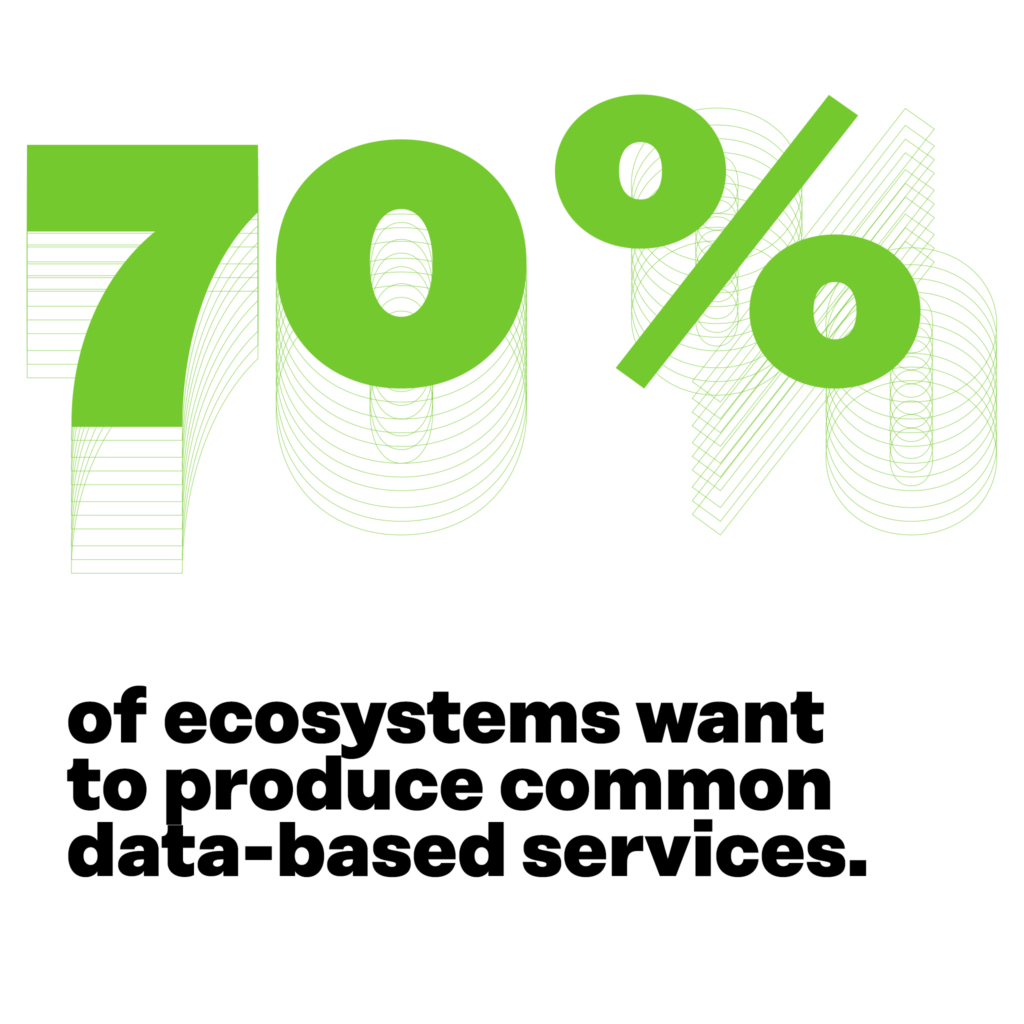
Networking as a strength
The main strengths of data ecosystems and networks were identified as networking skills (82%), customer-oriented service development skills (66%) and scientific skills (63%). Respondents were able to select more than one strength.
The emergence of networking skills as a key strength is not surprising. By definition, working in ecosystems requires the ability to connect, collaborate and find the right partners. Identifying partners can be challenging, so broad networks help to find the right people to join in. In addition, each member will likely have their own objectives for getting involved. Collaborative skills are needed to agree on common goals that benefit all parties.
Customer focus and scientific expertise are key business drivers. Identifying these as strengths shows that the conditions for better co-creation of services and products exist in ecosystems. According to the survey respondents, product and service development was the main reason for sharing data in ecosystems.
We have a common mission-type goal, which requires ecosystem expertise and collaboration. Often new solutions require a systemic change in the value chain.
Member of a data network
The ecosystem was created to accelerate collaboration and emerging business in the region.
Member of a data network
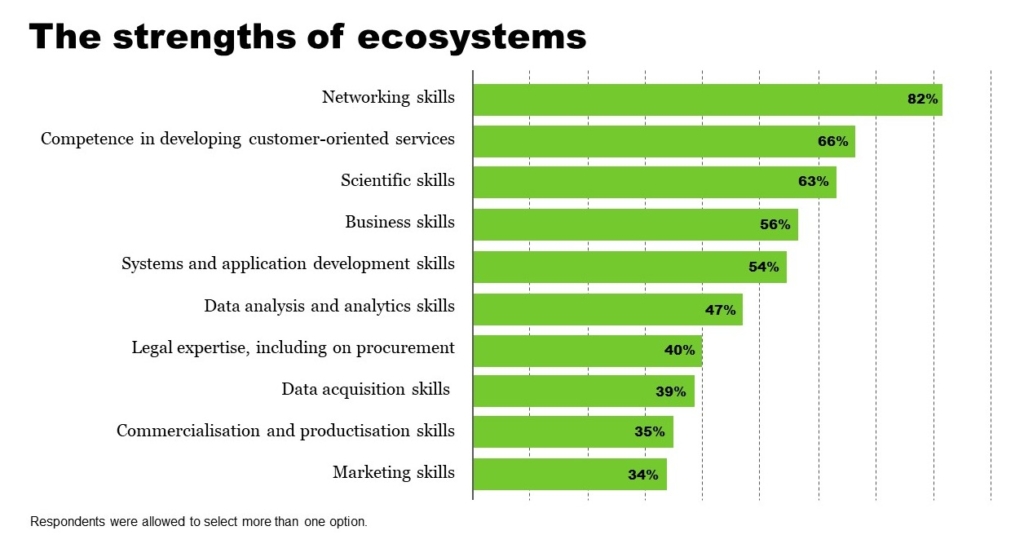
The responses also highlighted trust as one of the strengths of ecosystems. Building understanding and trust is a key prerequisite for ecosystem collaboration. In the survey, 76% of respondents rated their trust in ecosystem partners as high or moderately high.
At the same time, however, up to half of the respondents felt that their own ecosystem participants were able to work together reasonably well, but not yet effectively. More precise roles within ecosystems and networks are needed. Sitra’s handbook on data use and sharing, which is currently being developed for ecosystems, also provides support and tools for such a role.
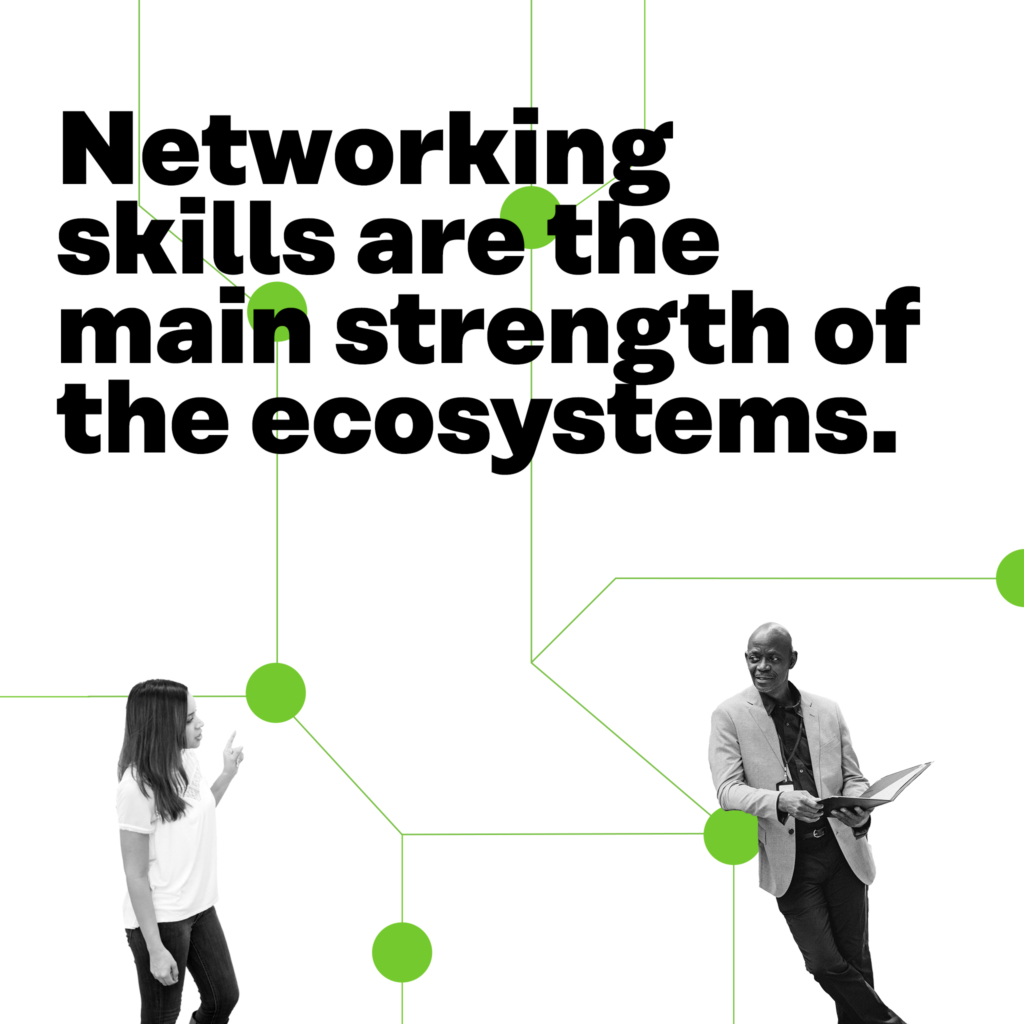
Lack of business know-how and funding are obstacles
Is there anything holding back the development of ecosystems? According to the survey, the main areas for development of ecosystem cooperation are
- Business growth and/or renewal,
- Resourcing of activities; and
- Streamlining data management and sharing.
The challenge of business growth and renewal. Operating in an ecosystem is different from traditional business, where other industry players can be seen primarily as competitors. Joining an ecosystem requires an organisation to revamp its mindset and business models, which is not always easy. A recent survey by Business Finland came to similar conclusions: Finland needs significantly more data business skills and a culture of collaboration at individual, organisational and industry levels.
The challenge of resourcing ecosystem activities. Ecosystems may face challenges in accessing funding, sufficient human resources or the necessary technology to operate effectively.
A similar observation has been made in Sitra’s ongoing projects working with different ecosystems. It can be difficult for an organisation to disengage its own staff from ecosystem activities. Often, especially in the early stages, ecosystem work is carried out alongside other activities of the organisation, and it takes a long time to assess whether it is at all worthwhile. It can therefore seem risky for companies to invest organisational resources in something whose productivity is difficult to anticipate.
The main challenge is to create value for participants quickly enough.
Member of a data network
In terms of the types of funding available, they are mainly suitable for either billion-dollar business ecosystems or for the operations of a large company in the industry and its partners. Smaller, emerging companies may easily be left out in the cold.
The reason for the low investment appetite of ecosystem operators may be that data sharing is not yet seen as a business opportunity. Public organisations may face the challenge of obtaining direct, targeted funding to operate in data ecosystems or make public data available to different data ecosystems.
The challenge of managing and seamlessly sharing data. Ecosystems do not yet have well-established policies and ways of sharing data. It is also possible that organisations do not yet fully understand data as a commodity and are therefore reluctant to share it.
We would like to expand the ecosystem, but we have not found good ways to involve more “core members”.
Member of a data network
“Collaboration and development takes time.
Member of a data network
Find out more about the Data for Growth programme
To start using data at an organisational level, you can find support in the self-study materials (in Finnish) of the Data for Growth programme developed by Sitra. The toolkit shows how to use data to create new business.
Bold action for functioning ecosystems
The basic idea of the data economy is simple: sharing data with others increases the value of data and enables new value to be created. The survey revealed that the topic of the data economy and ecosystems is still difficult and complex to grasp, even for those involved in them. Much work is needed from the public sector and businesses to enable ecosystems to develop to their full potential.
The public sector can support ecosystem development by such things as taking an active role in data ecosystem activities, facilitating collaboration forums, supporting various data-sharing pilots and channelling funding to ecosystem development. In addition, the public sector can contribute to building the capacity of organisations to seize the opportunities offered by emerging data regulation, particularly in the areas of data governance and mobility. The public sector can also lead the way in making its own data available to all.
Businesses can contribute to more effective development of ecosystems by having the courage to experiment with their partners at an early stage of business cooperation. Sitra’s work with ecosystems has shown that it is only when data-sharing experiments and pilots are designed in practice that it is possible to properly understand what factors need to be taken into account and the real potential of the collaboration. Emerging ecosystems should learn from existing experiments, such as the Sitra-supported data-sharing experiments for batteries in non-road machinery.
The survey results show that Finnish organisations have woken up to the opportunities offered by the data economy and ecosystems, and that the field is constantly evolving. To get the full picture, it is worth consulting the Fair Data Economy Roadmap (in Finnish), which provides an up-to-date view of the data economy in Finland, the state of intent at national level and the measures to take the data economy forward.
The survey was conducted as part of Sitra’s Fair Data Economy theme, which uses projects and initiatives to promote changes in economic structures, empower individuals to influence data use and provide practical tools for companies operating in the data market.
Read more
Results of the survey Development phase of data driven ecosystems and networks 2023
